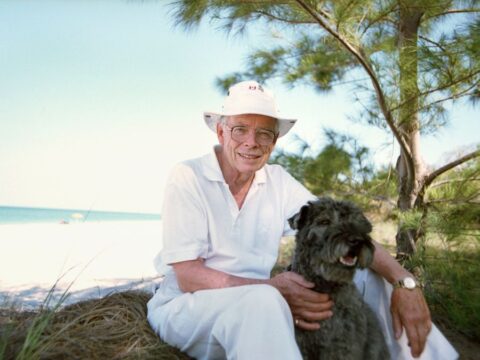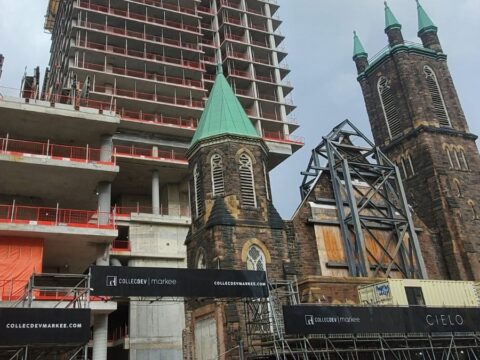At the opening worship of the 41st General Council in August, Moderator Mardi Tindal reflected on Micah 6:8, the Old Testament verse forming the theme for this year’s meeting: “And what does the Lord require of you but to [seek] justice, and to love kindness, and to walk humbly with your God?”
“How are you embracing humility in the church where you are?” she asked the 350 commissioners assembled in a gym on the campus of Carleton University in Ottawa.
You may unsubscribe from any of our newsletters at any time.
Over the following week, the commissioners approved a comprehensive review of the entire structure of the United Church, adopted a new church crest with Aboriginal elements, authorized economic action against Israeli settlements in the occupied West Bank, and elected the first openly gay moderator in the United Church’s history — who is also the first openly gay leader of a major Christian denomination anywhere.
In that sense, then, I’m not sure how deeply the commissioners took Tindal’s suggestion of humility. She probably doesn’t mind.
This was the fifth General Council I’ve attended, but the first as a member of the media. Being at a General Council is the only way to fully realize how big the United Church still is. Everything happens on a larger scale: the music is livelier and louder, the policy debates are more far-reaching (and sometimes more tedious), and the youth program is more expansive, bringing together the best future leaders from across the country. It’s an exhilarating experience.
But General Council also confronts you with the intimidating range of issues facing the United Church. Groups trying to get by with less-than-sufficient resources include rural congregations, francophone ministries, Aboriginal ministries, campus ministries, youth ministries, children’s ministries, interfaith partnerships and so on. Some argue that with a shrinking revenue base, the church needs to start doing less — but if so, what goes?
For that matter, is ministers’ pay too low, and is the centralized payroll system working well? Is power too concentrated in the General Council Executive? Is there equal treatment for ordained, diaconal and lay ministers? Oh, and why is the pension board investing in mining companies with questionable ethical practices? Welcome to General Council.
In her accountability report, Tindal spoke of her travels around the country, meeting with United Church congregations. Along with stories of inspiration, she told stories of struggle. “In many places, the healing work is about acknowledging the grief that some things are ending,” she said, “and the excitement for what is coming into birth.”
This is what Tindal called the “paradox of abundance and scarcity,” and as the week went on, there were many more paradoxes to come. There are contradictions and tensions in nearly every debate the United Church has; decision-makers must navigate competing forces from within and without.
The author F. Scott Fitzgerald said the sign of a first-rate intelligence is “the ability to hold two opposed ideas in the mind at the same time, and still retain the ability to function.” If he had ever hung around a national United Church gathering, he would have found it to be a very intelligent group indeed.
It must be difficult for reporters from the mainstream media to cover General Council. The debates can be downright chaotic, bogging down in points of order or halting periodically for prayer or worship. A new and frequently bewildering wrinkle involves taking the temperature of commissioners — orange card for hot, purple for cold — before moving on to the next step in the voting process. This commitment to democracy is admirable, but messy. I feel sorry for reporters who are thrust cold into this.
I’m less sympathetic to the columnists who only write about the United Church when they want to pick on it. You’ve likely seen their columns, the gist of which is this: “The United Church is dying, and its ministers have replaced God with leftist activism, and all it ever does anymore is try to boycott Israel.” They talk to a minister or a couple of our 500,000 members and it becomes gospel.
True, it’s less fun to write about the United Church’s extraordinarily diverse theology and how its membership is simultaneously full of hope and fear for the coming years. Yet it’s also not that hard to get to know the church for the quirky, complicated and surprising place it can be — if you’re willing to take the time. There was one particular debate that exemplified this for me. The proposal: “That the 41st General Council take a stand against the spreading of gossip in the same manner that it has taken a stand against gambling and other evils of society.”
I admit to being one of those who had a chuckle at this motion ahead of time. But the hour-long debate over it was conducted with a highly charged mix of humour and solemnity. A few questions were immediately raised: How is gossip defined? Is it really an evil like gambling addiction? And if the United Church passes this motion, what exactly happens?
There was a heated exchange over whether the term “malicious” should be added to clarify the motion. Concern was expressed that “gossip” was a gender-loaded term. One commissioner took offence at the time being spent on the proposal, while other business remained untouched.
With the debate verging on bedlam, a minister finally stood up and implored the room to take action. “I don’t know of any other issue that makes ministry more difficult than this one,” he said. Rumours can tear apart congregations, demoralize Official Boards and plunge Presbyteries into dysfunction. He said, correctly, that everybody with experience in the United Church has seen it happen. The motion passed.
I doubt much will change as a result of the motion, yet it was clearly an important discussion to have. This is what I mean about paradoxes.
Instead, and predictably, the national media were mainly interested in Israel-Palestine. Most reporting largely missed the point of what actually happened. So let me explain what I saw.
When the Israel motion first hit the floor, its language clearly placed the onus of blame on Israel. Two wording changes were immediately approved. The settlements were originally described as “the primary contributor” to injustice in the region; this was changed to “a major contributor.” The dismantling of the settlements was originally called a “necessary first step” toward peace; this was changed to “a necessary step.” Thus, within minutes, the motion was significantly defanged.
Then a large amendment came along. The addition denounced all violence and incitement to violence against Israel. It denounced the demonization of Israel and any question of Israel’s right to exist. It also clearly stated that the United Church was committed to a lasting peace in the region and called for dialogue with all sides to achieve this. A later amendment explicitly denounced violence by the settlers toward Palestinians.
I understand why reporters and editors want to focus on the damage this motion has done to relationships with some — but only some — Jewish groups. But what people need to know is that the United Church forged an independent path here. The church did not allow hardline anti-Israel activists to manipulate its policy, despite years of pressure to do so. Nor did the church submit to the extensive media campaign and, frankly, outright bullying and insults to its leadership mounted by hardline pro-Israel organizations.
Calling for a boycott of pro-ducts made in the settlements is not a radical or one-sided policy. The official stance of the Canadian government (and many other governments) is that the settlements are illegal. The United Church is simply joining a long line of other denominations and organizations in North America and Europe who are fed up with the incessant settlement expansion and the diminishing chances for peace they represent.
It is true, as some commissioners pointed out afterward, that there was surprisingly little debate on the boycott itself. I also agree with the sentiment that the United Church has many other urgent issues to work on, and the repeated attempts over the past decade to take economic action against Israel have eaten up far too much time and resources.
Yet despite these concerns, the United Church has ended up with a fair and appropriate policy on the Israeli settlements. To call it a boycott of the State of Israel is simply wrong. This is a small-scale, targeted campaign against the relatively few products made in the settlements. Don’t pay attention to those in the media who were never interested in giving the United Church a fair shake in the first place.
On the second day of General Council, I dropped in on Youth Forum, the General Council program for people aged 15 to 20. Though they take part in General Council proceedings, Youth Forum participants are not voting members. I myself have been a member of Youth Forum three times. When I arrived, seven past moderators were addressing the room: Bruce McLeod, Stan McKay, Marion Best, Bill Phipps, Marion Pardy, Peter Short and David Giuliano. They all spoke of the challenges faced by the United Church during their terms — everything from the devastating rifts caused by the sexual orientation debates of the 1980s and ’90s to worries about bankruptcy due to lawsuits over residential schools.
Afterwards, one of the Youth Forum participants commented, “We hear often right now that the United Church is going through a time of doom and gloom. But based on what you said, it seems that General Councils are always full of doom and gloom.”
Of course, the former moderators had also spoken of positive developments, but this important point struck home: let’s keep things in perspective. Times have been tough for a long time, and it’s possible they are never going to get easier. But there are also as many good things happening in the United Church as there have ever been.
The Youth Forum program itself is under stress. For the first time I know of, Youth Forum participants were barely present in the main General Council court this year. They missed nearly every speech, missed all of the policy debates and weren’t there for a single part of the Israel-Palestine discussion.
Youth Forum planners, dealing with a $100,000 budget reduction, had to cut back somewhere, and they chose the orientation session that normally prepares participants for General Council business. This came in the context of large budget cuts for many General Council meeting expenses. (I don’t want to shock you, but the church is a little tight on money these days.)
True, there were more under-30 commissioners at General Council than ever. That was great. But Youth Forum is different. No other program does a better job of bringing this age group into the United Church’s leadership positions. There aren’t easy solutions here, but I really hope the General Council Executive thinks long and hard about the future vision of Youth Forum before the next General Council in 2015.
General Council 41 ended with the installation of a new moderator, Rt. Rev. Gary Paterson. That the United Church’s first openly gay moderator is the spouse of the first openly gay minister ordained in the United Church is almost too serendipitous to believe. Yet I also admire Paterson’s resolve to not let identity politics define his election. He wants to be known for his convictions.
Paterson is by all accounts a smart and serious leader. He has a difficult job in front of him, as he shepherds a structural review process and negotiates many conflicts that lie ahead.
On the morning of Paterson’s installation, two of the very few children in attendance at General Council handed him a T-shirt and a memory box. “Exercise your ministry with laughter and playfulness,” they requested. “You bet,” he responded.
***
This story first appeared in The United Church Observer’s October 2012 issue with the title “General Council: a gathering of contradictions.”














